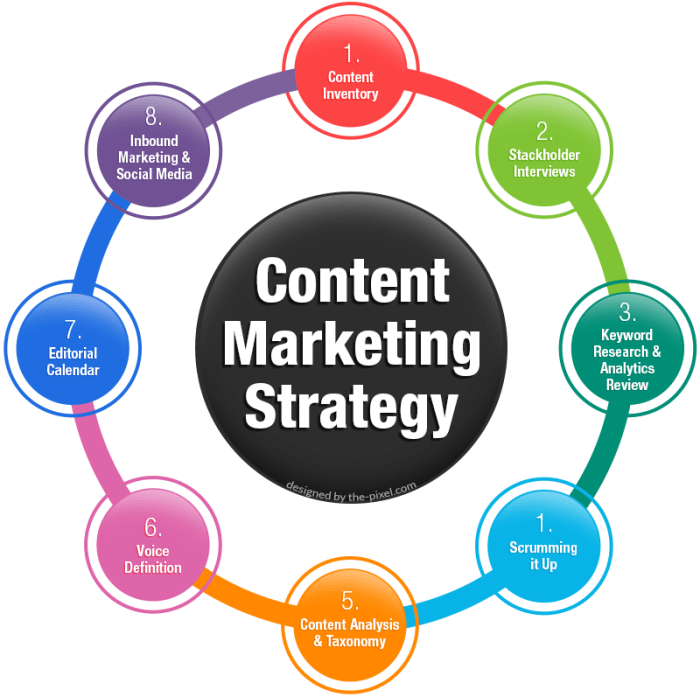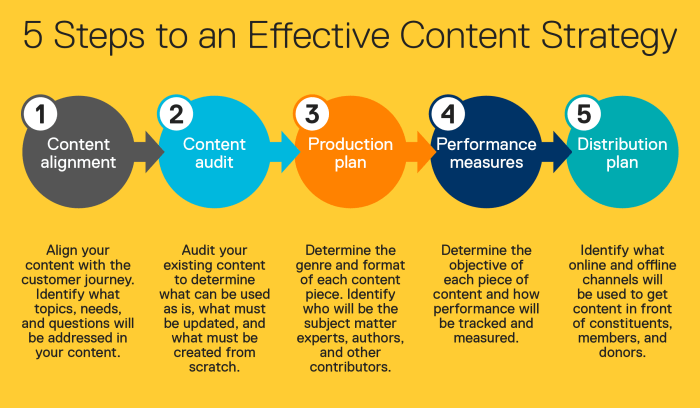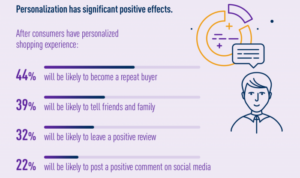Content Marketing Strategy sets the stage for a digital marketing revolution. Dive into this narrative filled with the essence of successful brand tactics and innovative approaches, designed to captivate and inspire.
Uncover the secrets to creating compelling content, engaging your audience, and measuring the impact of your strategy in a fast-paced online world.
Overview of Content Marketing Strategy
In the world of digital marketing, a content marketing strategy is like the secret sauce that helps businesses stand out in a crowded online space. It involves creating and distributing valuable, relevant, and consistent content to attract and retain a clearly defined audience.
Example of Successful Content Marketing Strategies
- Red Bull: Red Bull is known for its extreme sports sponsorships and high-energy content. They have built a loyal following by creating exciting videos and events that resonate with their target audience.
- Dove: Dove’s “Real Beauty” campaign is a prime example of a successful content marketing strategy. By promoting body positivity and self-acceptance, Dove has connected with consumers on a deeper level, leading to increased brand loyalty.
- GoPro: GoPro’s user-generated content strategy has been a game-changer in the world of content marketing. By encouraging customers to share their own action-packed videos, GoPro has created a vibrant community of brand advocates.
Importance of a Well-Defined Content Marketing Strategy
A well-defined content marketing strategy can work wonders for businesses looking to achieve their marketing goals. It helps in:
- Building brand awareness and credibility
- Driving organic traffic to the website
- Generating leads and nurturing customer relationships
- Increasing sales and revenue
Remember, content is king in the digital realm, and a solid content marketing strategy is the crown jewel that can set your business apart from the competition.
Elements of a Strong Content Marketing Strategy

When it comes to crafting a killer content marketing strategy, there are several key elements that you absolutely need to include. From defining your target audience personas to incorporating engaging storytelling and visuals, each component plays a crucial role in the success of your overall strategy.
Defining Target Audience Personas, Content Marketing Strategy
Before you even think about creating content, it’s essential to clearly define who your target audience is. By developing detailed personas that represent your ideal customers, you can tailor your content to meet their specific needs, preferences, and pain points. This not only helps you create more relevant and impactful content but also ensures that your messaging resonates with the right people.
Storytelling, Visuals, and Multimedia Content
Storytelling is a powerful tool that can captivate your audience and create a lasting connection with your brand. By weaving compelling narratives into your content, you can engage readers on a deeper level and leave a lasting impression. Additionally, incorporating visuals and multimedia elements such as videos, infographics, and interactive content can help break up text-heavy pieces and make your content more engaging and shareable.
Content Creation and Distribution

Creating high-quality content for a content marketing strategy involves thorough research, understanding your target audience, and crafting engaging and valuable content that resonates with them. This process includes brainstorming ideas, outlining the content, writing or creating the content, editing and proofreading, and finally, publishing and promoting it.
Types of Content Formats
- Blog Posts: Written articles that provide valuable information, insights, or updates related to your industry or niche.
- Videos: Visual content that can be used for tutorials, product demonstrations, interviews, or storytelling to engage your audience.
- Infographics: Visual representations of data or information that are easy to digest and share on social media platforms.
- Podcasts: Audio content that allows you to share expert interviews, discussions, or industry insights with your audience.
- Social Media Posts: Short and engaging content that can include images, videos, or text updates to connect with your audience on various platforms.
Distribution Channels
- Website/Blog: Your own platform where you can publish and promote your content to attract visitors and generate leads.
- Social Media: Platforms like Facebook, Instagram, Twitter, LinkedIn, and Pinterest where you can share your content and engage with your audience.
- Email Marketing: Sending out newsletters or updates to your subscribers with links to your content to drive traffic to your website.
- Guest Posting: Writing content for other websites or blogs in your industry to reach a new audience and build backlinks to your site.
- : Optimizing your content for search engines to improve visibility and attract organic traffic to your website.
- Content Syndication: Distributing your content through third-party platforms or websites to reach a wider audience and increase brand awareness.
Measuring Success and ROI: Content Marketing Strategy
In the world of content marketing, it’s crucial to measure the success of your strategy to ensure you’re getting a return on your investment. This involves tracking key metrics and analyzing data to determine the effectiveness of your content efforts.
Key Metrics for Measuring Success
- Website Traffic: Monitoring the number of visitors to your website can help you understand the impact of your content on driving traffic.
- Engagement Metrics: Tracking metrics like time spent on page, bounce rate, and social shares can provide insights into how engaging your content is.
- Conversion Rate: Measuring the percentage of visitors who take a desired action, such as filling out a form or making a purchase, can indicate the effectiveness of your content in driving conversions.
- Lead Generation: Keeping track of the number of leads generated through content can help you assess the quality of your content in capturing potential customers.
Importance of Analytics in Content Marketing
Analytics play a critical role in content marketing by providing valuable insights into the performance of your content and helping you make data-driven decisions. By analyzing data, you can identify trends, understand audience behavior, and optimize your content strategy for better results.
Tools for Analyzing Content Marketing Performance
Google Analytics
Google Analytics is a powerful tool that allows you to track website traffic, user behavior, and conversions, providing detailed insights into the performance of your content.
SEMrush
SEMrush is a comprehensive digital marketing tool that offers analytics and insights to help you optimize your content for better search engine visibility and performance.
HubSpot
HubSpot provides a range of tools for inbound marketing, including analytics to track the effectiveness of your content in generating leads and conversions.
BuzzSumo
BuzzSumo is a tool that helps you analyze content performance, identify trending topics, and track social media engagement, allowing you to refine your content strategy for maximum impact.





